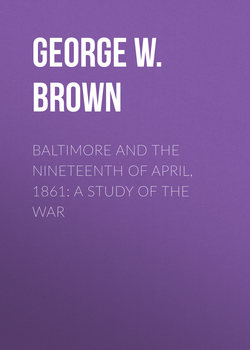Baltimore and the Nineteenth of April, 1861: A Study of the War

Реклама. ООО «ЛитРес», ИНН: 7719571260.
Оглавление
George W. Brown. Baltimore and the Nineteenth of April, 1861: A Study of the War
CHAPTER I
CHAPTER II
CHAPTER III
CHAPTER IV
CHAPTER V
CHAPTER VI
CHAPTER VII
CHAPTER VIII
CHAPTER IX
APPENDIX I
APPENDIX II
APPENDIX III
APPENDIX IV
APPENDIX V
APPENDIX VI
Отрывок из книги
For a period the broad provisions of the Constitution of the United States, as expounded by the wise and broad decisions of the Supreme Court, had proved to be equal to every emergency. The thirteen feeble colonies had grown to be a great Republic, and no external obstacle threatened its majestic progress; foreign wars had been waged and vast territories had been annexed, but every strain on the Constitution only served to make it stronger. Yet there was a canker in a vital part which nothing could heal, which from day to day became more malignant, and which those who looked beneath the surface could perceive was surely leading, and at no distant day, to dissolution or war, or perhaps to both. The canker was the existence of negro slavery.
In colonial days, kings, lords spiritual and temporal, and commons, all united in favoring the slave trade. In Massachusetts the Puritan minister might be seen on the Sabbath going to meeting in family procession, with his negro slave bringing up the rear. Boston was largely engaged in building ships and manufacturing rum, and a portion of the ships and much of the rum were sent to Africa, the rum to buy slaves, and the ships to bring them to a market in America. Newport was more largely, and until a more recent time, engaged in the same traffic.
.....
When the Republican Convention assembled at Chicago in May, 1860, in the heat of the contest, which soon became narrowed down to a choice between Mr. Seward and Mr. Lincoln, the latter dispatched a friend to Chicago with a message in writing, which was handed either to Judge Davis or Judge Logan, both members of the convention, which runs as follows: "Lincoln agrees with Seward in his irrepressible-conflict idea, and in negro equality; but he is opposed to Seward's higher law." But there was no substantial difference between the position of the two: Lincoln's "divided house" and Seward's "higher law" placed them really in the same attitude.
The seventh resolution in the Chicago platform condemned what it described as the "new dogma that the Constitution, of its own force, carries slavery into any or all of the Territories of the United States." This resolution was a direct repudiation by a National Convention of the decision of the Supreme Court in the Dred Scott case.
.....